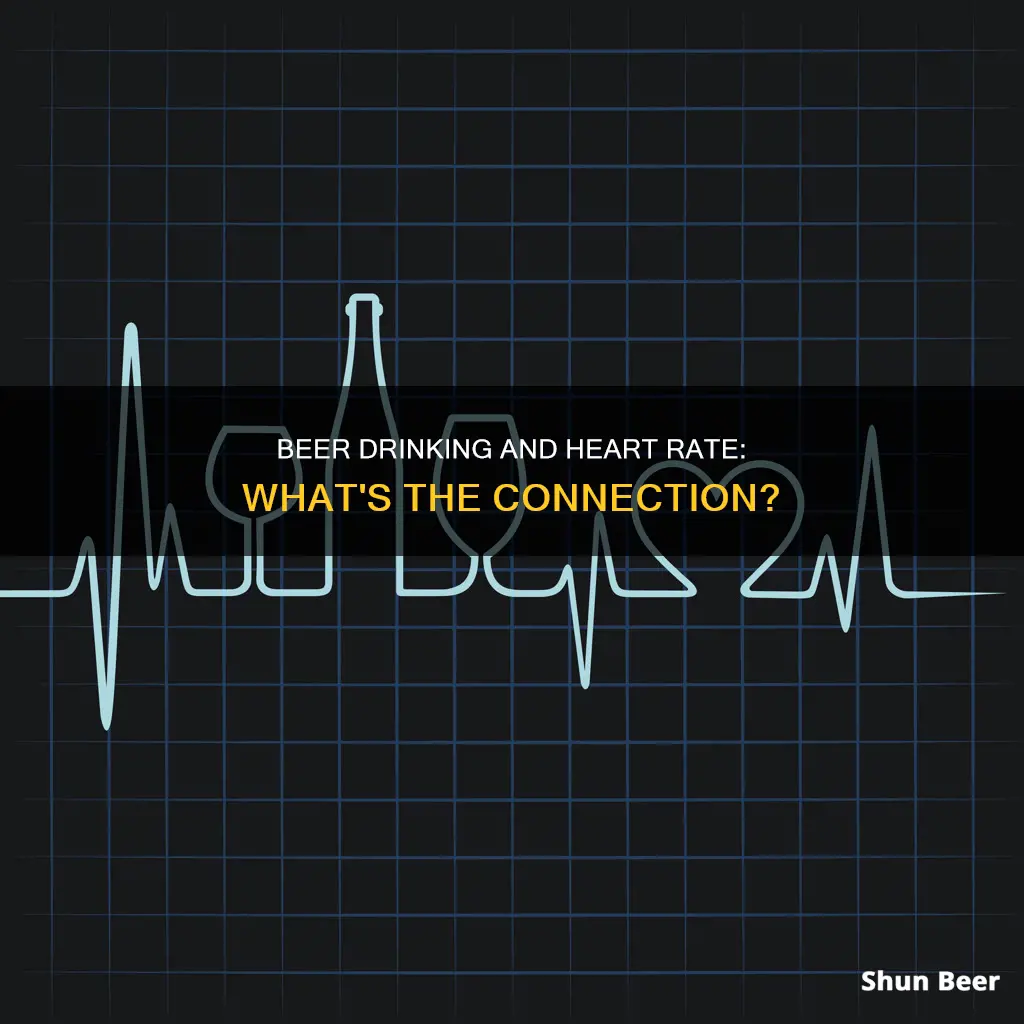
Alcohol can have a significant impact on your cardiovascular system, and beer is no exception. While a glass or two of wine can help you relax, it can also cause your heart to beat faster, at least temporarily. So, what about beer? Can drinking it raise your pulse? The answer is yes. Consuming alcohol, including beer, can lead to a temporary increase in heart rate. This effect is more pronounced with heavier consumption, and it can last for several hours. While this may not be a concern for most healthy adults, it could be problematic for those with heart rhythm issues or conditions like atrial fibrillation.
| Characteristics | Values |
|---|---|
| Can drinking beer raise your pulse? | Yes, drinking beer can raise your pulse. |
| How does alcohol affect the pulse? | Alcohol can disrupt the heart's natural pacemaker, causing it to beat faster and out of rhythm. |
| Who is at risk? | People with conditions that cause irregular heart rhythms, such as atrial fibrillation, and those at high risk for heart attacks or strokes should be cautious. |
| How much alcohol can affect the pulse? | The more alcohol consumed, the greater the increase in heart rate. Binge drinking (more than 5 drinks in a row) can also lead to an increased risk of atrial fibrillation. |
| What are the health risks associated with an increased pulse due to alcohol consumption? | An increased pulse due to alcohol consumption can lead to atrial fibrillation, which is associated with an increased risk of blood clots, strokes, heart failure, and other heart conditions. |
| How to slow down the pulse after drinking alcohol? | Stop drinking, rehydrate with water and electrolytes, sit down and relax, practice deep breathing, and apply a cold compress to the face. |
What You'll Learn

Alcohol can trigger atrial fibrillation (AFib)
Drinking alcohol can increase the risk of atrial fibrillation (AFib), a condition that causes the heart to beat very fast and out of rhythm. AFib can lead to blood clots, strokes, heart failure, and other heart conditions.
Doctors believe that alcohol disrupts the heart's natural pacemaker, the electrical signals that are supposed to keep it beating at the right pace. Alcohol consumption slows down breathing and dilates the blood vessels, causing the heart to pump harder and faster to circulate blood throughout the body.
Research has shown that binge drinking (consuming large amounts of alcohol in a short period) can trigger AFib. This phenomenon is called "holiday heart" because doctors see more cases during holidays when people tend to overindulge in alcohol. However, even small amounts of alcohol can increase the risk of AFib.
A 2011 study published in the Journal of the American College of Cardiology analyzed data from 14 studies investigating the link between alcohol consumption and AFib development. The researchers concluded that avoiding alcohol is the best way to prevent the risk of AFib.
Another study by UC San Francisco found that a single glass of wine can significantly raise the risk of AFib within a few hours. The study suggested that reducing or avoiding alcohol may help mitigate harmful effects.
For people who already have AFib, alcohol appears to have an almost immediate effect on their heart rhythm. A study found that a single drink doubled the odds of an AFib episode within the next four hours.
If you have AFib and alcohol triggers your symptoms, it is advisable to avoid drinking. It is important to weigh the risks and consult a doctor about your health history to determine what makes the most sense for you.
Beer and Eliquis: Safe Mix?
You may want to see also

Drinking alcohol can lead to tachycardia
Alcohol is a depressant, which means it slows down the brain's ability to control the body. While one drink may initially cause blood vessels to dilate, reducing the amount of blood the heart has to move, two drinks have the opposite effect. The second drink increases activity in the sympathetic nervous system and the amount of blood moving through the heart. It also further slows down breathing, impacting the amount of oxygen in the blood. As a result, the heart has to pump harder and faster to circulate blood around the body.
Alcohol and cardiac arrhythmias
Acute alcohol consumption has been associated with cardiac arrhythmias, particularly sinus tachycardia. A study of 3028 participants at the 2015 Munich Octoberfest found that 30.5% of participants experienced cardiac arrhythmias, with sinus tachycardia being the most common, affecting 25.9% of participants.
Holiday Heart Syndrome
Drinking a large quantity of alcohol in a short period can have toxic effects on the heart muscle, causing a disruption in heart rhythm known as "fibrillation". This is when the heart tries to beat so quickly that it only twitches or quivers, and cannot pump blood effectively. This can lead to blood clots, strokes, heart failure and other heart conditions.
Beer and Straws: A Refreshing Combination?
You may want to see also

Binge drinking can cause holiday heart syndrome
Binge drinking can lead to a condition known as "holiday heart syndrome", which is mainly used by doctors in the US to describe the manifestation of cardiac arrhythmias following a period of binge drinking. The condition was first described in 1978 by Ettinger et al., who observed 24 patients hospitalized with atrial fibrillation after a weekend of binge drinking. The term "holiday" refers to the fact that these events are more frequent during weekends and holidays when people are more prone to binge drinking.
Holiday heart syndrome is characterized by an irregular heartbeat, often experienced as a fluttering in the chest. If left untreated, it could lead to blood clots, stroke, heart failure, or a heart attack. The exact mechanisms behind the development of arrhythmia are unclear, but several factors may contribute to it. Firstly, alcohol interferes with nerve conduction in the heart, altering the rate of nerve signal transmission across the heart muscle. Secondly, alcohol can increase the release of adrenaline, which can change the heartbeat. Thirdly, fatty acids in the blood increase following alcohol consumption and are associated with the development of atrial fibrillation. Lastly, the alcohol metabolite acetaldehyde can increase the rate of abnormal muscle contraction.
The risk of developing atrial fibrillation is higher in binge drinkers compared to those who drink moderate amounts or no alcohol. According to the Copenhagen City Heart Study, heavy alcohol use was responsible for 5% of atrial fibrillation cases in men, and the risk of developing atrial fibrillation was 1.5 times higher in binge drinkers. It is important to note that quitting alcohol reverses the atrial fibrillation-causing effects, and in those with no underlying heart conditions, it seems to have no long-term damaging effects.
To avoid holiday heart syndrome, it is recommended to avoid binge drinking and not to exceed more than one drink per day for women or two drinks per day for men. Additionally, limiting fatty, sugary, and salty foods and avoiding overeating can also help reduce the risk. While caffeine has not been proven to increase atrial fibrillation when consumed in normal amounts, it is still advisable to avoid excessive caffeine intake, especially for those sensitive to its effects.
Cemetery Drinking: Is Beer Allowed on Sacred Grounds?
You may want to see also

Alcohol can affect your blood pressure
The impact of alcohol on blood pressure also depends on the amount consumed. A single drink may have little effect on blood pressure, but with two drinks, a person may experience a slight dip in blood pressure levels. However, when consumption exceeds two drinks, blood pressure levels initially fall and then start to climb, eventually becoming slightly elevated several hours later. This rise in blood pressure is especially true in cases of binge drinking, which is defined as consuming four or more drinks within two hours for women and five or more drinks for men.
The mechanism behind alcohol's effect on blood pressure involves its impact on the cardiovascular system. Alcohol is a depressant, slowing down the brain's control over the body, including breathing and heart rate. While one drink can reduce the amount of blood the heart needs to move by dilating blood vessels, additional drinks slow down breathing further, impacting oxygen levels in the blood. This leads to increased activity in the sympathetic nervous system and more blood flowing through the heart, causing it to pump harder and faster to circulate blood.
The link between alcohol consumption and blood pressure has been supported by various studies. One study involving 32 clinical trials showed that alcohol consumption affected heart rates and blood pressure readings shortly after drinking. Another study found a strong association between average daytime and nighttime heart rate and usual alcohol intake. It is important to note that the effects of alcohol on blood pressure can vary from person to person, depending on age, medical history, and other factors.
Antibiotics and Alcohol: Safe Mix When Treating Chlamydia?
You may want to see also

Alcohol can cause an irregular heartbeat
Drinking alcohol can cause an irregular heartbeat, a condition known as atrial fibrillation (AFib). AFib causes the heart to beat rapidly and out of rhythm, potentially leading to blood clots, strokes, heart failure, and other heart conditions. While a glass of wine or a beer may be good for your heart, drinking alcohol, especially in excess, can disrupt the heart's natural pacemaker and electrical signals, resulting in an irregular heartbeat.
How Alcohol Affects the Heart
Alcohol is a depressant that slows down the brain's ability to control the body. While this can lead to a relaxed state, it also impacts the cardiovascular system. Alcohol consumption causes a dilation of blood vessels, which initially reduces the amount of blood the heart needs to pump. However, as breathing slows and oxygen levels in the blood decrease, the heart must work harder to circulate the same amount of blood throughout the body, resulting in an elevated heart rate.
Risk Factors
The risk of developing AFib increases with the amount of alcohol consumed. Studies have shown that drinking as little as one to three alcoholic beverages per day can increase the risk of AFib by 8% for every extra drink. Binge drinking, defined as consuming more than five drinks in a row, further elevates the risk. Additionally, certain individuals are more susceptible to AFib, including those with diabetes, sleep apnea, high blood pressure, and obesity.
Preventative Measures
To reduce the risk of alcohol-induced AFib, it is recommended to limit alcohol consumption to no more than two drinks per day for men and one drink per day for women. Abstaining from alcohol is advised for individuals diagnosed with AFib, as studies have shown that AFib episodes decrease in frequency when alcohol is avoided. Maintaining a healthy lifestyle, including regular exercise and a balanced diet, can also help mitigate the risk of developing AFib.
Warning Signs
While an elevated heart rate after drinking alcohol is not uncommon, it is important to be vigilant for warning signs of a more serious issue. These signs may include chest pain or discomfort, pain in the jaw, neck, shoulder, or back, and numbness or weakness in the face, arm, or leg. If you experience any of these symptoms, it is crucial to seek medical advice promptly.
Drinking Non-Alcoholic Beer in Public: Is It Okay?
You may want to see also
Frequently asked questions
Yes, drinking beer can raise your pulse. Alcohol can cause your heart to beat faster and harder, and the more you drink, the greater the increase in heart rate.
Alcohol is a depressant, which means it slows down your brain's ability to control your body. As a result, your breathing slows, and your blood vessels dilate, causing your heart to pump harder and faster to circulate blood throughout your body.
According to experts, drinking in moderation is key. Heavy drinking is linked to heart failure and liver disease. Binge drinking, defined as more than five drinks in a row, also increases the risk of atrial fibrillation, an irregular heartbeat.







